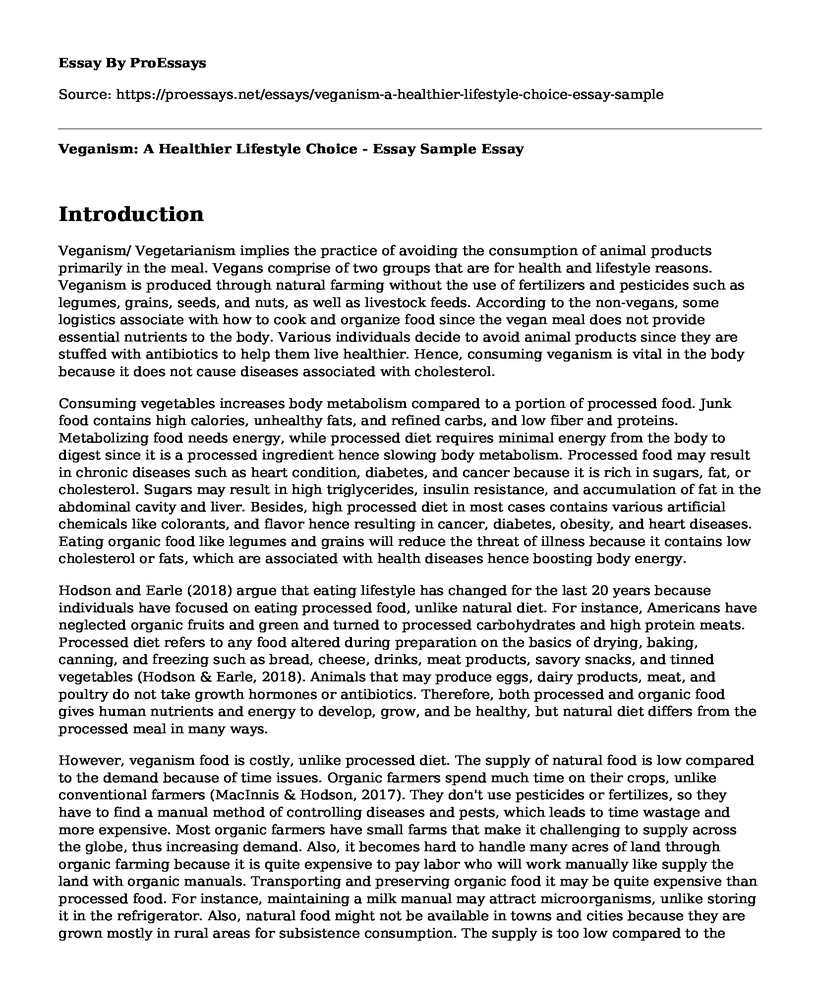Introduction
Veganism/ Vegetarianism implies the practice of avoiding the consumption of animal products primarily in the meal. Vegans comprise of two groups that are for health and lifestyle reasons. Veganism is produced through natural farming without the use of fertilizers and pesticides such as legumes, grains, seeds, and nuts, as well as livestock feeds. According to the non-vegans, some logistics associate with how to cook and organize food since the vegan meal does not provide essential nutrients to the body. Various individuals decide to avoid animal products since they are stuffed with antibiotics to help them live healthier. Hence, consuming veganism is vital in the body because it does not cause diseases associated with cholesterol.
Consuming vegetables increases body metabolism compared to a portion of processed food. Junk food contains high calories, unhealthy fats, and refined carbs, and low fiber and proteins. Metabolizing food needs energy, while processed diet requires minimal energy from the body to digest since it is a processed ingredient hence slowing body metabolism. Processed food may result in chronic diseases such as heart condition, diabetes, and cancer because it is rich in sugars, fat, or cholesterol. Sugars may result in high triglycerides, insulin resistance, and accumulation of fat in the abdominal cavity and liver. Besides, high processed diet in most cases contains various artificial chemicals like colorants, and flavor hence resulting in cancer, diabetes, obesity, and heart diseases. Eating organic food like legumes and grains will reduce the threat of illness because it contains low cholesterol or fats, which are associated with health diseases hence boosting body energy.
Hodson and Earle (2018) argue that eating lifestyle has changed for the last 20 years because individuals have focused on eating processed food, unlike natural diet. For instance, Americans have neglected organic fruits and green and turned to processed carbohydrates and high protein meats. Processed diet refers to any food altered during preparation on the basics of drying, baking, canning, and freezing such as bread, cheese, drinks, meat products, savory snacks, and tinned vegetables (Hodson & Earle, 2018). Animals that may produce eggs, dairy products, meat, and poultry do not take growth hormones or antibiotics. Therefore, both processed and organic food gives human nutrients and energy to develop, grow, and be healthy, but natural diet differs from the processed meal in many ways.
However, veganism food is costly, unlike processed diet. The supply of natural food is low compared to the demand because of time issues. Organic farmers spend much time on their crops, unlike conventional farmers (MacInnis & Hodson, 2017). They don't use pesticides or fertilizes, so they have to find a manual method of controlling diseases and pests, which leads to time wastage and more expensive. Most organic farmers have small farms that make it challenging to supply across the globe, thus increasing demand. Also, it becomes hard to handle many acres of land through organic farming because it is quite expensive to pay labor who will work manually like supply the land with organic manuals. Transporting and preserving organic food it may be quite expensive than processed food. For instance, maintaining a milk manual may attract microorganisms, unlike storing it in the refrigerator. Also, natural food might not be available in towns and cities because they are grown mostly in rural areas for subsistence consumption. The supply is too low compared to the demand, thus making people involve in consuming processed food.
Therefore, veganism is crucial in the human body because it eradicates the issues of diseases linked with cholesterol like high blood pressure and diabetes. Veganism is produced through natural farming without the use of fertilizers and pesticides such as legumes, grains, seeds, and nuts, as well as livestock feeds. The meals improve body metabolism because less energy is needed in the digestion process. Hence, people should emulate eating vegetarianism, unlike processed food.
References
Hodson, G., & Earle, M. (2018). Conservatism predicts lapses from vegetarian/vegan diets to meat consumption (through lower social justice concerns and social support). Appetite, 120, 75-81. https://doi.org/10.1016/j.appet.2017.08.027
MacInnis, C. C., & Hodson, G. (2017). It ain't easy eating greens: Evidence of bias toward vegetarians and vegans from both source and target. Group Processes & Intergroup Relations, 20(6), 721-744. https://doi.org/10.1177/1368430215618253
Cite this page
Veganism: A Healthier Lifestyle Choice - Essay Sample. (2023, May 22). Retrieved from https://proessays.net/essays/veganism-a-healthier-lifestyle-choice-essay-sample
If you are the original author of this essay and no longer wish to have it published on the ProEssays website, please click below to request its removal:
- Weight, Diet and Body Image Essay
- Chocolate Chip Cookies Essay
- Essay Sample on Food Wastage: An Issue of Global Concern
- Dunkin Donuts vs Starbucks: Porters Five Analysis - Essay Sample
- Start a Unique Business: Nail Salon & Coffee Shop - Essay Sample
- Essay Example on Drink Coffee, Live Longer?
- Paper Example on Nutrition: A Vital Key to a Healthy Lifestyle







